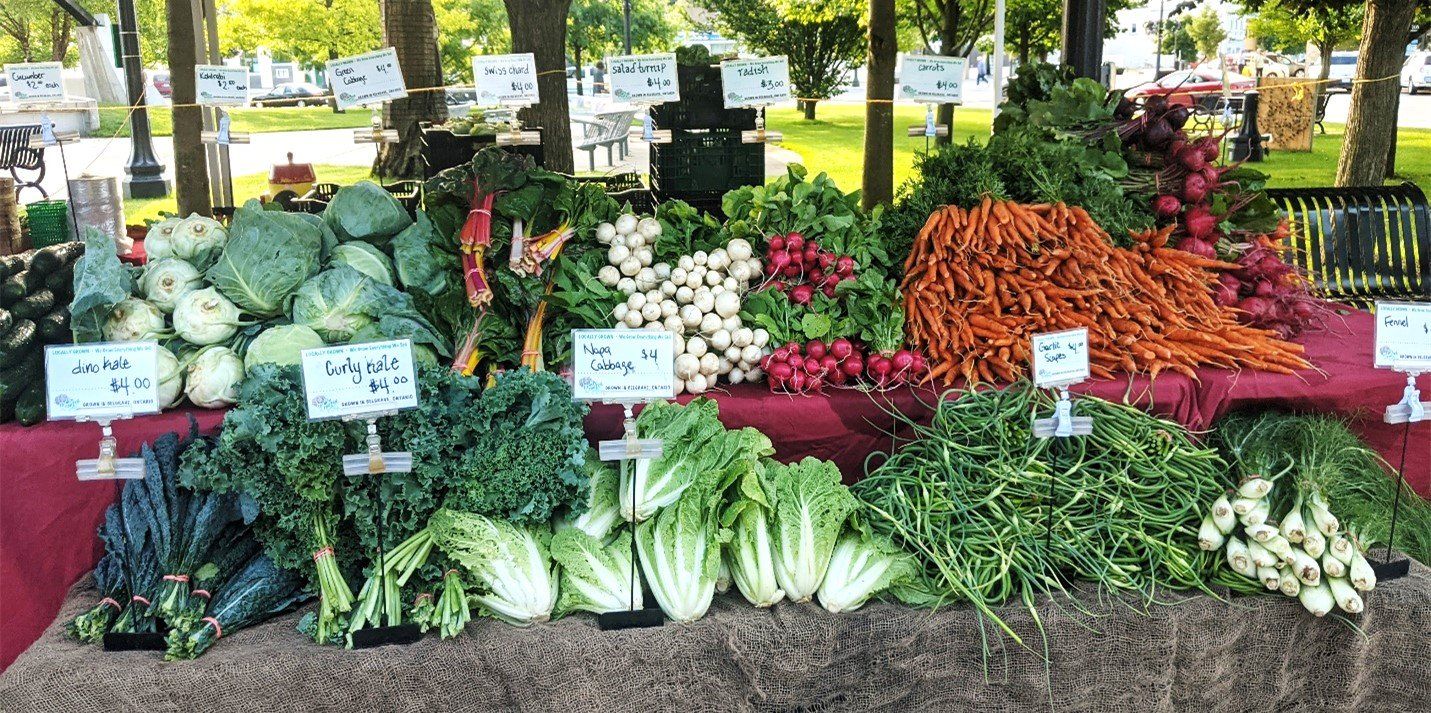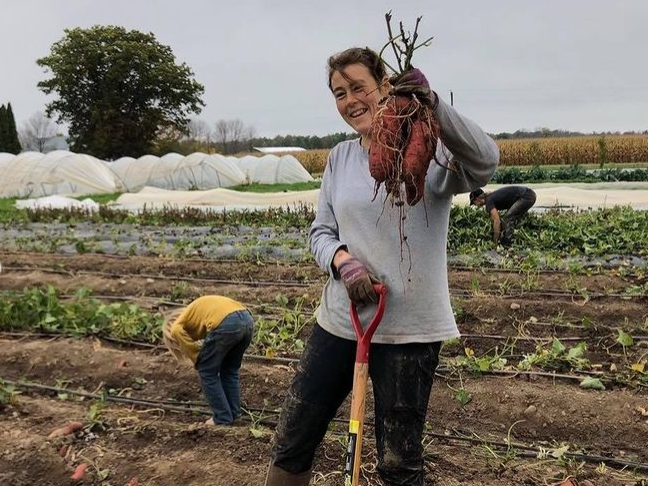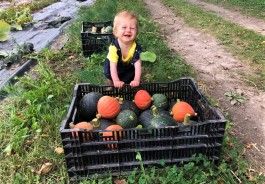October 7, 2021
The Lettuce Rejoice!
Firmly Rooted Farm's Newsletter for their Veggie Loving Farm-ily

On the Farm: Feeling Frosty and a Little Squashed
Hello again my veggie loving friends,
As the threat of frost looms in the distance, we are ensuring the most sensitive crops still in the fields are harvested or tucked protectively away under row cover. Some of you may be interested to know that the chance of frost increases or decreases based upon cloud cover; if it is a clear night, and temperatures dip to 4 degrees or lower, the chance of frost is high. This is because when clouds are present at night while the earth is cooling, the clouds act as mild insulators, preventing heat from escaping into the atmosphere, causing temperatures to decrease at a slower rate, reducing the likelihood of frost. But as I write this, at 9:30 pm on the eve of September 30th, I can quite clearly see that the sky outside has not a cloud in sight. My mind slips to my poor little peppers and tomatillos I haven’t found the time to harvest; here’s hoping that if it does frost, it’s only mild.
One crop we’ve had harvested at the farm for a while due to the chance of frost is squash. Squash is an interesting vegetable to grow; there are countless varieties, with various odd shapes and sizes, hosting a range of flavours and purposes. They can also be finicky, even the most resilient winter squash must be stored in the most ideal conditions, otherwise, you risk losing the harvest to mould. But squash sure is exciting to grow. All those crazy and sometimes insanely huge varieties foster much delight amongst squash aficionados.
Squash is a vegetable name that describes thousands of cultivars from three main cucurbit species. The word squash is descended from the indigenous language Narragansett word askutasquash, meaning “eaten raw or uncooked,” suggesting squash was once popularly eaten in such a manner. Narragansett is a language of the Massachusetts people and is part of the Algonquin language family. Squash was first cultivated in the Americas as many as 4,000 years ago, by indigenous peoples stretching from Central America to the northeastern parts of areas today known as Canada and the United States. This expansive amount of time, and the tendency for squash plants to cross-pollinate to create new varieties, allowed indigenous people ease in creating new and locally adapted cultivars. The seed was exchanged through well-connected trade routes that stretched across the Americas well before European contact. It is these trade routes that transported corn, cultivated in the area now known as Mexico, and beans, cultivated in regions of Mexico and Peru, to areas where they converged with peoples growing squash. Together, these three crops are known as the Three Sisters.
The Three Sisters are part of an Iroquois creation story. The story begins with a Sky Woman peering through a hole in the sky from the upper world. She falls through the hole down into the infinite sea. The animals see her falling and quickly place soil on the back of a turtle to ensure her safe landing, creating Turtle Island, today’s North America. The Sky Woman is pregnant and gives birth to a daughter. When the daughter grows to be a woman, she becomes pregnant with The West Wind but dies while birthing her twin sons. The Sky Woman buries her daughter in the new earth and from the burial site grows three plants: corn, beans, and squash. These plants provide enough nourishment to feed the sons and generations to come and become known as the Three Sisters.
The importance of these three crops to indigenous agricultural communities cannot be understated. They were often grown as companion plants; the corn provided a pole for beans to climb, the beans provided nitrogen in the soil for the nitrogen hungry corn, the squash provided ground cover to repress weeds and retain soil moisture for all. Additionally, together these three vegetables are delicious and nutritious. Corn and squash provide carbohydrates as well as vitamins and minerals, while beans are an excellent source of protein. The seeds of squash can be eaten for healthy fats. Together these vegetables hold sacred meaning for the indigenous peoples of Turtle Island.
I feel it most poignant today to share the indigenous teachings behind squash and other vegetables, given that Canada’s first National Day of Truth and Reconciliation has passed, and our country has begun what I hope is a meaningful reckoning with our continuing colonial legacy. I hope to honour these indigenous teachings by sharing their knowledge and wisdom as best I can, especially considering we owe thanks for the cultivation of many vegetables we enjoy so joyfully. Firmly Rooted is located on the ancestral lands of the Mississauga, Odawa, and Anishinabewaki indigenous peoples, who historically traded and share history with the Iroquois First Nations of the Great Lakes basin.
Kitchen Corner

Given the season (it’s officially soup season), one of the best ways to enjoy squash is in Three Sisters soup. This soup provides sustenance and a story. I’ve shared with you a recipe I’ve adapted from the cookbook tawâw by Chef Shane Chartrand, a wonderful anthology of indigenous dishes, shared along with knowledge regarding indigenous culture and experiences. If you love cooking and wish to explore indigenous cuisine in a progressive light, I highly recommend this cookbook. But if this is too involved for you, do not fret, for squash is greatly enjoyed simply roasted and finished with a touch of butter and salt. Delish.
Kitchen Clean-Up
It is the last week for the summer share, so make sure to use up any credits you have if you don’t have a winter share to carry them over to! Refer to this guide from Harvie University to learn how to redeem your credits. If you have any trouble, feel free to reach out by email to farmshare@firmlyrooted.ca with any questions you might have.
That’s all for now folks, happy eating until next time!
Farmer Erika




